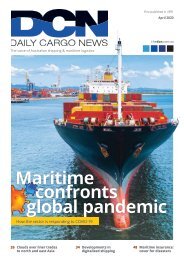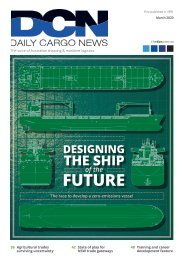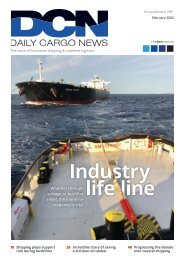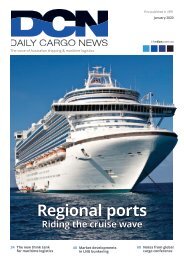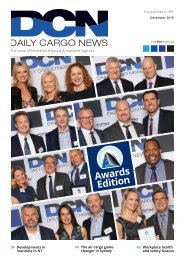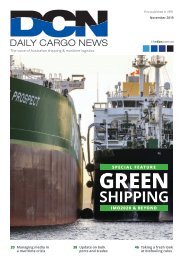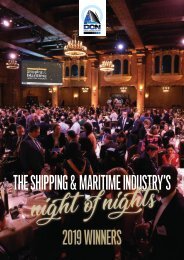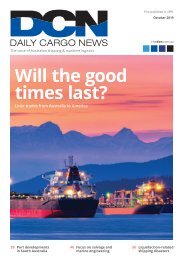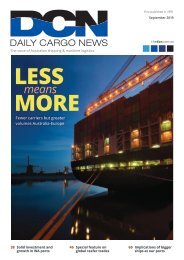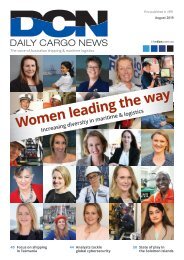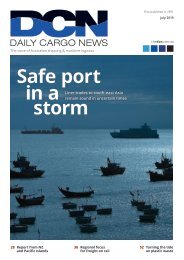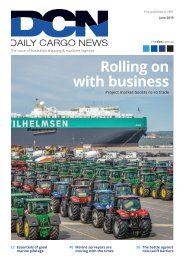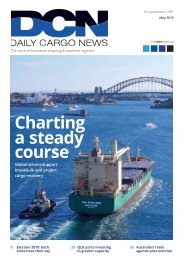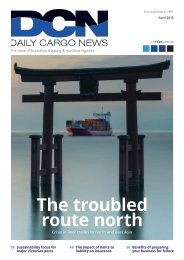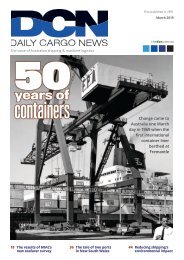DCN0718_Combined_150
You also want an ePaper? Increase the reach of your titles
YUMPU automatically turns print PDFs into web optimized ePapers that Google loves.
the Australian International Trade<br />
and Transport Industry Development<br />
Fund (or AITDF). The establishment<br />
of the PSG mirrors the existence of a<br />
similar group known at the WCO as<br />
the Private Sector Consultative Group<br />
whose work includes reporting to the<br />
WCO Policy Commission on issues<br />
such as the implementation of the TFA.<br />
• Engagement should not be confined to<br />
work though the various collaborative<br />
forums. Government and its agencies<br />
regularly seek the views of interested<br />
parties in developing legislation or<br />
new trade initiatives such as FTAs. It<br />
org.au/publications/trade-policyrecommendations-5-0-2018<br />
which<br />
identifies some measures to assist<br />
SMEs and MSMEs<br />
• Those providing finance to the supply<br />
chain should be looking to the<br />
development of new products to assist<br />
those involved in trade. Recently,<br />
the Export Finance and Investment<br />
Commission (EFIC) has been<br />
developing new products but there are<br />
more to be developed especially those<br />
supporting MSMEs.<br />
• The private sector has pressed<br />
government and its agencies for<br />
Ultimately, even though the private sector parties may<br />
have different positions on some issues and different<br />
degrees of self-interest, the wider interests of all<br />
parties are served by sensible collaborative action<br />
Ian Ackerman<br />
Above: Andrew Hudson is a partner with<br />
Rigby Cooke Lawyers in Melbourne<br />
direct involvement with the Customs<br />
Brokers and Forwarders Council<br />
of Australia, the Export Council of<br />
Australia (ECA) and the Food and<br />
Beverage Importers Association, that<br />
the role of industry associations is vital<br />
and needs to be supported. Members<br />
of industry get significant value<br />
through their financial support and<br />
commitment to assist associations.<br />
• Industry associations should look<br />
to leverage collective expertise<br />
and resources to advance interests<br />
which may be held by them, even if<br />
they reserve their own positions on<br />
certain specific points. An informal<br />
Private Sector Group (PSG) has<br />
been established at NCTF with the<br />
assistance of a secretariat funded by<br />
is in the interests of all parties that<br />
the private sector makes its interests<br />
known at an early stage to aid the<br />
development of the outcomes.<br />
• There needs to be close review of<br />
fees and practices adopted by private<br />
operators of facilities in the supply<br />
chain as those fees and practices<br />
can readily become an impediment<br />
to access to the facilities and a<br />
disincentive to trade. Those affected<br />
in the private sector of the supply<br />
chain may need to be more proactive<br />
in their approaches to competition<br />
authorities and government if there<br />
are issues of concern.<br />
• The private sector needs to support<br />
attention to the interests of small<br />
to medium enterprises (SMEs)<br />
also now known as micro, small<br />
and medium enterprises (MSMEs).<br />
Bigger enterprises (or associations<br />
supporting those enterprises) often<br />
have the resources to support and<br />
promote their own interests while<br />
SMEs/MSMEs do not have the same<br />
resources. Due to significant interest<br />
in these SME and MSME entities<br />
engaging in trade (evidenced by the<br />
current Parliamentary Inquiry at<br />
www.aph.gov.au/fta), their interests<br />
must also be supported by the private<br />
and public sectors. This is a focus<br />
of the ECA in its 2018 Trade Policy<br />
Recommendations at www.export.<br />
many years to adopt e-commerce<br />
initiatives such as the Single Window<br />
for Trade but there is much work<br />
to be done by the private sector to<br />
modernise its own practices in the<br />
private sector supply chain. For<br />
example, the continued reliance<br />
on paper documents for shipping<br />
and trade finance limits the ability<br />
of e-commerce to enhance trade<br />
and could diminish the widespread<br />
adoption and use of blockchain or<br />
port community systems. Similarly<br />
the adoption of more contemporary<br />
trade conventions, such as the<br />
Rotterdam Rules would assist in this<br />
process. Financiers, insurers and<br />
those providing transport such as<br />
shipping lines and airlines should<br />
consider whether there are ways in<br />
which they can advance these issues in<br />
conjunction with government.<br />
Ultimately, even though the private<br />
sector parties may have different<br />
positions on some issues and different<br />
degrees of self-interest, the wider<br />
interests of all parties are served by<br />
sensible collaborative action by the<br />
private sector with shared contributions<br />
to this trade-modernisation agenda.<br />
Being engaged at the beginning of the<br />
process is a far superior way to influence<br />
the outcome than trying to change<br />
outcomes which have already been<br />
agreed and implemented.<br />
thedcn.com.au July 2018<br />
57



